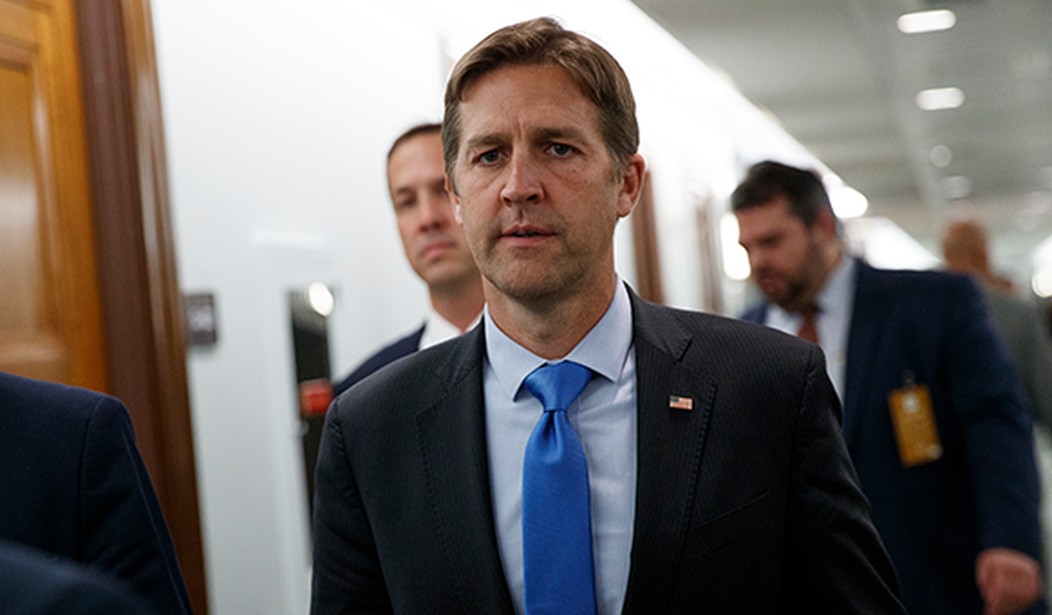Sen. Ben Sasse won reelection to his second term in 2020, meaning he still has four years to go before he faces another election. But according to multiple sources, he plans to resign from the Senate and take a job as president of a Florida university.
Sen. Ben Sasse, R-Neb., who frequently clashed with former President Donald Trump but won a second term in 2020, is expected to resign before the end of the year, a source familiar with the move confirmed to NBC News on Thursday…
Sasse has been at odds with Trump and his own party for years. After the Jan. 6, 2021, attack on the Capitol, Sasse was one of seven Republican senators who voted to convict Trump for his role in the deadly riot.
At about the same time word of Sen. Sasse’s planned resignation was breaking, the University of Florida announced they had unanimously chosen him as the finalist out of an initial search which involved about 700 prospects.
Sasse, 50, emerged as the sole finalist in a search that took place under a new Florida law that keeps the key early stages of a public university’s presidential selection process out of the public eye. But UF officials sought to allay any concerns, calling their process “exhaustive.”…
Sasse, who is two years into his second Senate term, was the search committee’s first choice by unanimous vote. He has five academic degrees and was president of a small Lutheran university in Nebraska before becoming a senator. He is sometimes mentioned as a future candidate for U.S. president and has faced backlash from his party for rebuking former president Donald Trump.
Sasse will visit the campus next week and then return in November for an interview with the board of trustees. Assuming all of that goes well he’ll resign his current position in the Senate sometime in December.
Sasse recently wrote a piece for the Atlantic which was critical of the Biden student loan bailout:
We need a rethink, renewal, and expansion—tinkering around the edges won’t cut it.
Sadly, Washington is getting ready to subsidize failure. A mega-bailout in the form of student-debt forgiveness would prop up and excuse the broken parts of this system—missing the opportunity to go bigger and help college-age Americans from every class and community learn skills, enhance persistence, find work, and embrace the dynamic opportunities of the coming quarter century. Massive forgiveness of student debt would most help upper-class Americans who are going to be just fine without a bailout. It’s a regressive mistake.
Only about one in eight Americans carries student-loan debt; of the $1.6 trillion or so of debt that students have racked up, 56 percent is held by white-collar workers with advanced degrees. About one-third is owed by the wealthiest 20 percent of households, and nearly two-fifths was acquired in pursuit of graduate credentials. The fact is, the typical student-debt holder is more likely to be white, is more educated, and has more earning potential than the median American…
The debt conversation is dominated by demagoguery. Politicians who want an easy fix are keen on debt forgiveness. The talking points sound great. Everyone wants to seem compassionate and generous. The truth is more complicated. But at a minimum, if the system is so broken that Washington is debating a trillion-dollar-plus bailout, isn’t it worth reforming the system so this doesn’t immediately happen again? To ignore root causes is like cleaning up a polluted beach downstream, while leaving the factory upstream pumping ever more contaminants into the water. We need to be talking about institutional reform.
So what does this mean for the balance in the Senate?
From a Husker to a Gator. @BenSasse intends to leave the Senate to lead the University of Florida. It won't change the balance of power, with GOP @GovRicketts in charge of appointing a successor. Will Ricketts name himself?https://t.co/IHiARED5f5
— Jeff Zeleny (@jeffzeleny) October 6, 2022
There are lots of people suggesting on Twitter that Gov. Ricketts may want to appoint himself because he’s term limited and leaves the governor’s office in January. I guess we’ll have to wait and see what happens, but whoever gets appointed will definitely be a Republican so this won’t impact the balance of power in the Senate.








Join the conversation as a VIP Member